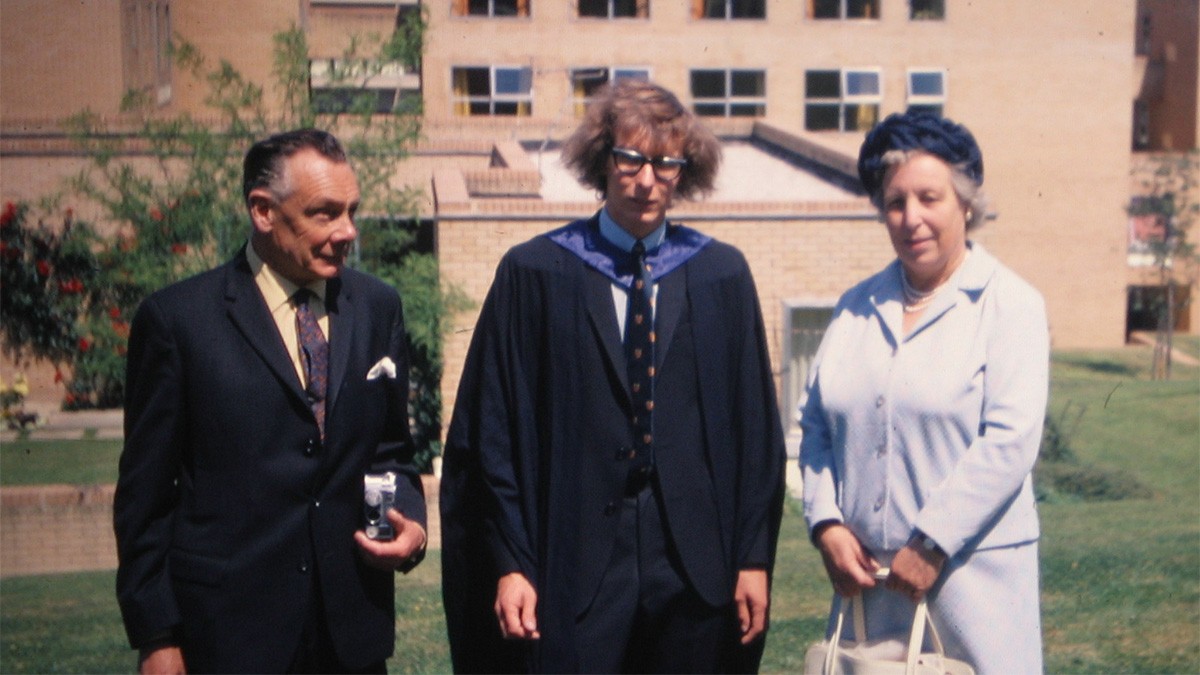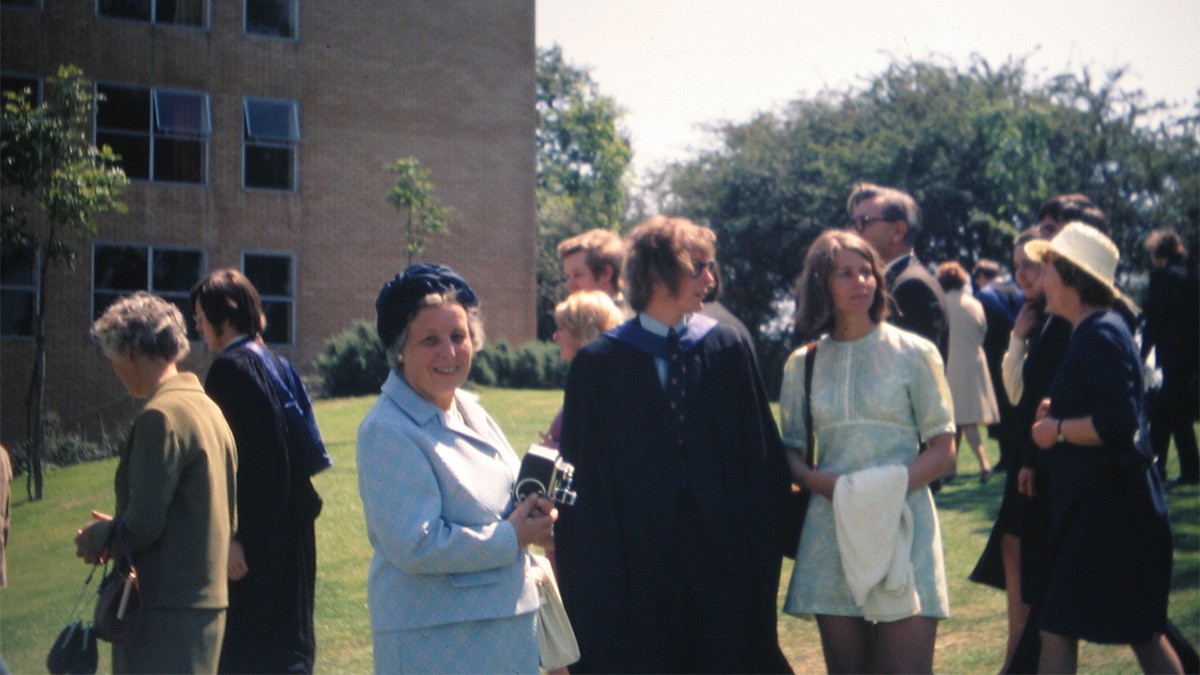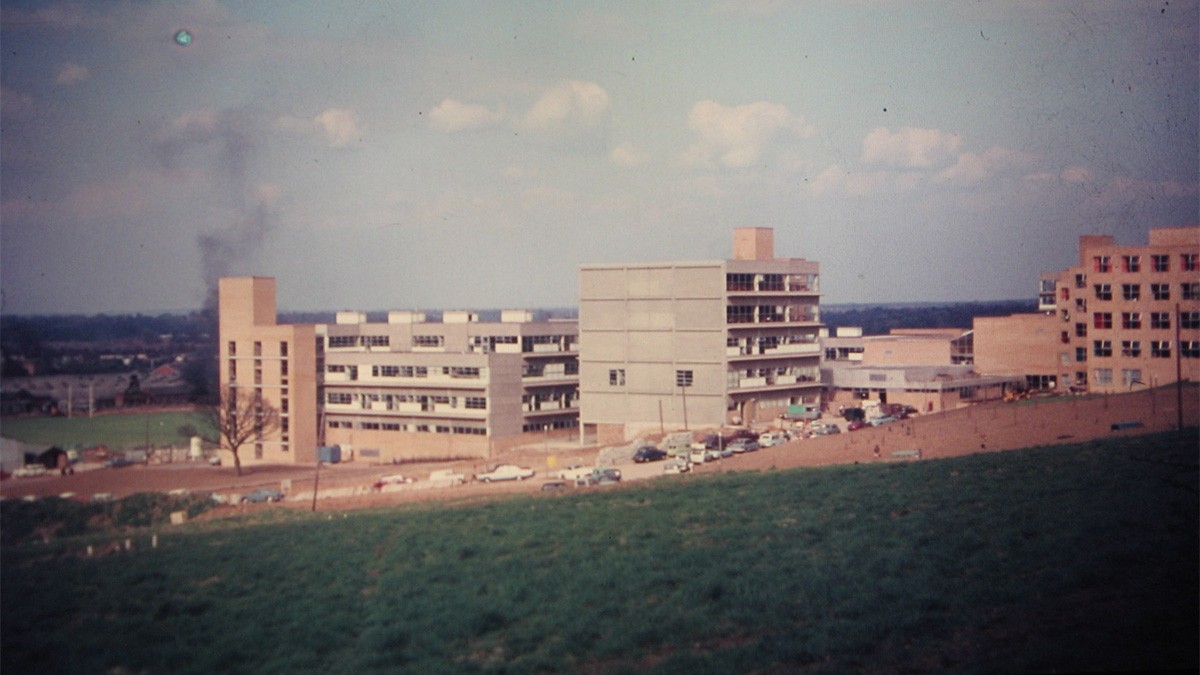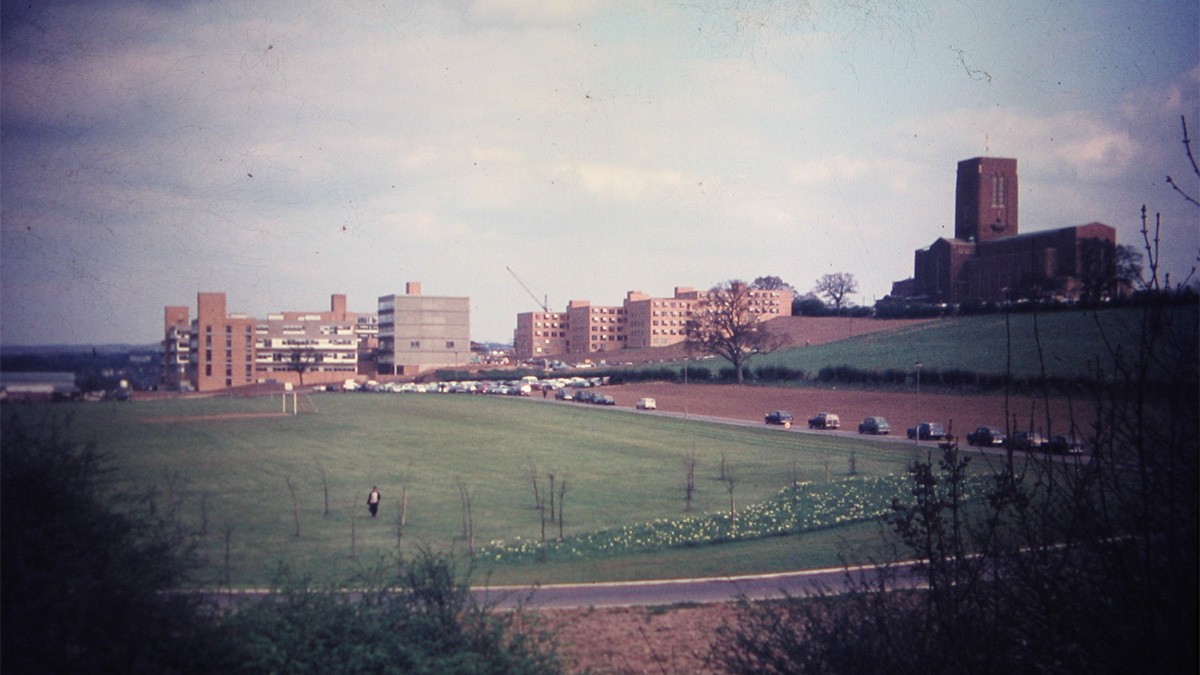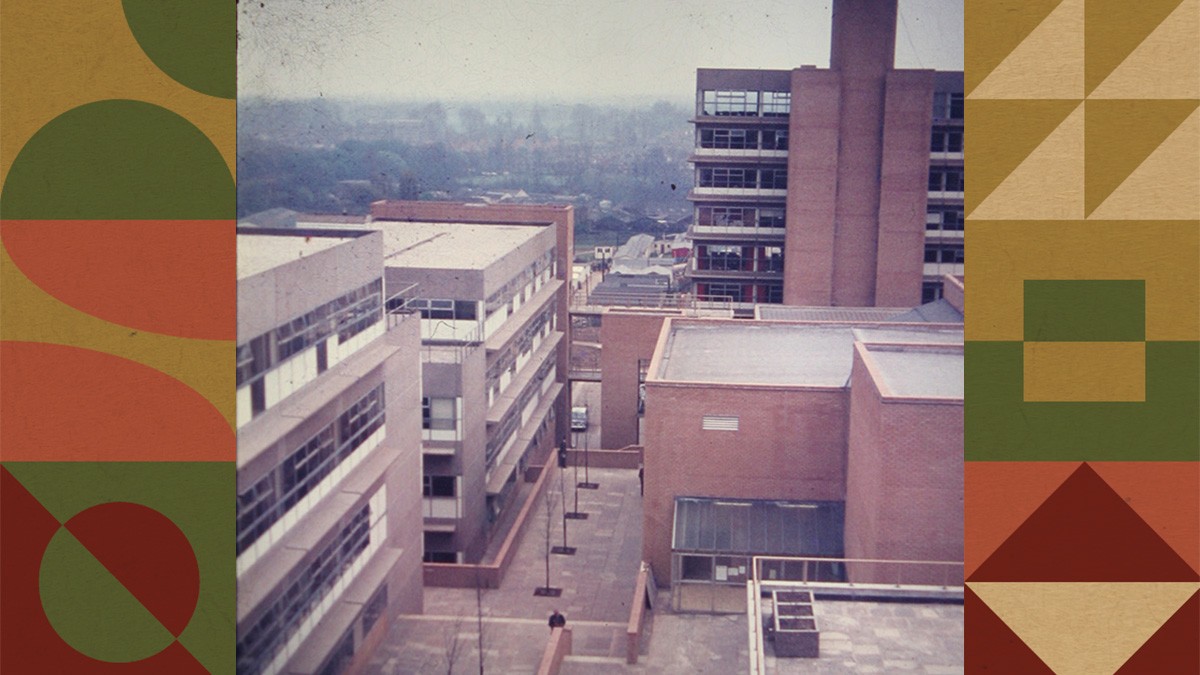“In Third Court, we brewed a lot of beer in the bath!”
Peter Linecar came to the University of Surrey to study a BSc in Metallurgy from 1968-1972. Bell-ringing, “bath beer”, a prank involving a bubble car and a lift, and meeting Graham Hill are among his student highlights…
Why did you come to Surrey?
I did well at A Level Physics and Chemistry, but I made a mess of A Level Maths. I went through clearing and I started a BSc in Chemical Physics at the Guildford campus in 1968.
What was it like to study at a new university?
It was a building site. They just about managed to get it open for the first influx of 300 students in 1968 with the bare essentials ready.
Senate House was open with the Vice-Chancellor’s office on the top floor. It had a bar and a restaurant on one floor, the Students’ Union was on another and that was about it. Academically, there was the Lecture Block and the Library. The only buildings were what are now called Lewis Carroll, Thomas Telford and Frank Whittle.
In my second year, they were constructing the next row of buildings, which were the Alan Turing and James Joule blocks. There was also a restaurant set up in a marquee to make a bit more space.
We were one of the only courses that had moved from Battersea to the Guildford campus at the time. There were about 300 of us in that first year. Because there weren’t many of us, we were a close-knit community.
Did you spend any time at Battersea?
I never studied at Battersea College of Technology, although it was still open as the University was undergoing its transition stage from 1968-1970. Ironically, the old College became part of London South Bank University where I ended up working many years later.
Tell us about your course…
Everyone in the sciences did a common first term called Principles of Engineering, Mathematics and Science – or PEMS. This included physics, chemistry, electrical engineering and a few other subjects. We then specialised in our degree subject proper.
Metallurgy was one of the subjects covered in PEMS and I realised I wanted to study it in more depth. I’ve always been practical and the thought of having fun in a steelworks probably spurred me on. One of the advantages of PEMS was that you could easily switch courses in the first term if there was another specialism that caught your interest.
What were the best bits of the course?
I spent a year in industry and I worked for six months in British Steel’s special steels division at Stocksbridge in Sheffield, then I spent another period working in the West Midlands on a blast furnace. I spent my third spell in Southampton for what, at that time, was the Central Electricity Generating Board. I worked in a research facility on high-power pressure stainless steel pipelines, when I wasn’t sailing dinghies on Southampton Water!
Did you enjoy your time as a student?
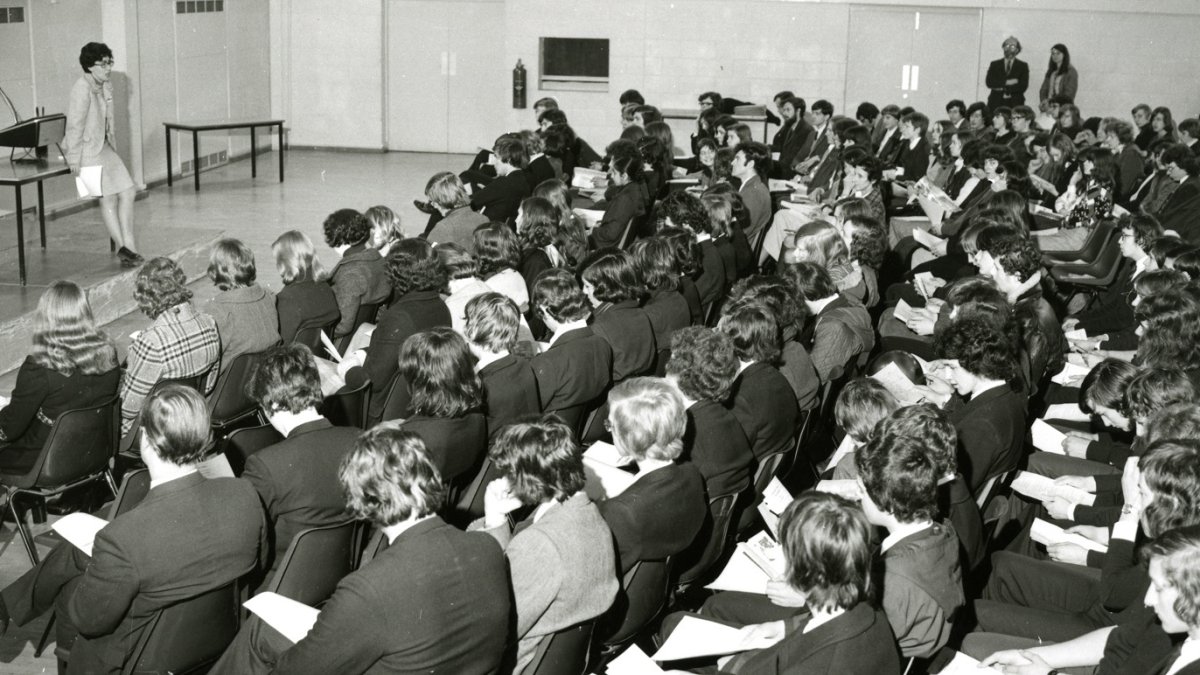
Professor Daphne Jackson delivering a lecture at Surrey
I never liked secondary school much, but being at University was a very positive experience. That was due to all the people around me.
For example, Daphne Jackson taught me. I was there when she became the first female Professor of Physics in the UK. She was a very good teacher. Professor Lew Elton was another member of the physics staff. He was entertaining and he could teach you anything.
On the metallurgy side, we had a lot of Polish staff. There was a large refugee community in South London and some of its academic members taught at Battersea College of Technology. They moved to Guildford when the University of Surrey was established.
Did you live in student accommodation?
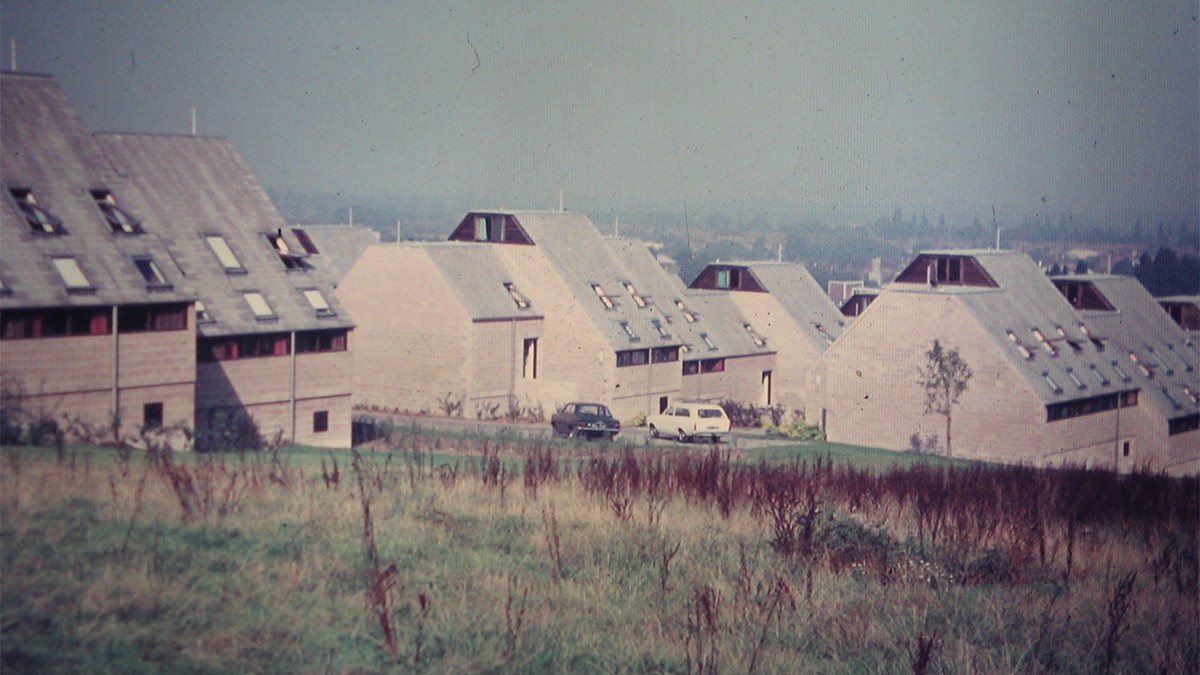
Peter spent his final year in "Diddy Town", which was the University's first venture into building communal houses rather than blocks of flats
I didn’t live on campus in my first year because there wasn’t much accommodation available. There were only two halls of residence, which were Surrey Hall and Battersea Hall. The priority was offering those places to undergraduates from overseas. Instead, I lived in digs near the Wooden Bridge pub.
In my final year, “Diddy Town” had been built. It was known as Third Court then. This was the University’s first venture into building houses rather than blocks of flats. There were ten students in each house with a communal living and cooking area, which made it a more friendly place to live. We had a good group in the house I was in.
Did you take part in any clubs or societies?
I joined the Motor Club during my second year and we attended a few racing events. We used to organise rallies among ourselves with a dozen or so students who owned cars. We’d plot a route and set off. I did most of my competitive racing in an Austin A30.
One year, we were lucky enough to get the two-times Formula One World Champion Graham Hill as a guest speaker. His appearance filled the biggest lecture theatre on campus. He was a great speaker and he told an anecdote about him travelling up the A3 to Guildford to attend the talk. He admitted he was going a bit over the speed limit and he was pulled over. A young policeman approached his car, leaned in the window and proceeded to say. “You were travelling very fast, sir. Who do you think you are, Graham Hill?”
What was Guildford like?
One of my interests was church bell-ringing and we used to take part in sessions at churches in and around Guildford. Holy Trinity at the top of the High Street was a place that we regularly visited. We also rang the bells at Guildford Cathedral and at a church in the village of Ash.
What are your key memories of Surrey?
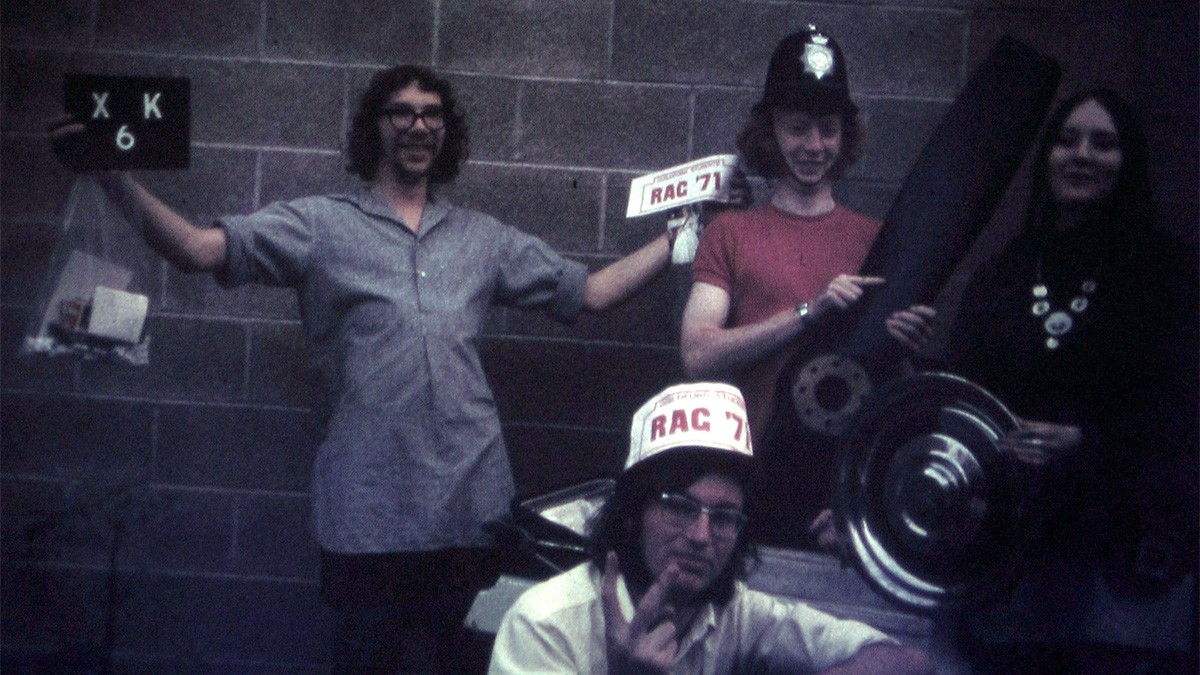
Peter with his friends at RAG Week in 1971
One thing I do recall was the Students’ Union acquiring a colour TV and lots of people crowding in there to watch Top of the Pops. Not many homes had a colour TV then. It was a real novelty.
I also had an Isetta bubble car while I was at Surrey. This was very small and lime green. During one RAG Week, a few of us worked out we could fit it into one of the service lifts in Thomas Telford. As a RAG stunt, we got it into the lift and parked it outside the Head of Metallurgy’s office.
In Third Court, we brewed a lot of beer. We fermented it in the bath. We never got round to bottling it up as we had regular parties where all the “bath beer” got drunk. The only potential problem with this was the bathroom extractor fan blew out in the direction of the warden’s house, so he clearly had suspicions about what was going on. We got round this by inviting him to the parties and he consumed as much beer as the rest of us.
You recall the Computing Centre, too?
The Computing Centre occupied an entire floor in the Library. It housed one mainframe computer. This was an ICL 1905. It was incredibly hi-tech at the time and it was the sole computer on campus.
The only way to access it was to visit the room it was kept in. You’d have to write out your programme manually, then convert it in a series of cards with holes punched into them. You’d have to do the latter manually. Then you’d hand over the cards and a member of staff would feed them into the machine. A few hours later, you’d come back and get to see if your programme had worked.
I remember one of my friends lost interest in his chemical physics course very quickly and he failed his second-year exams. But he spent a lot of his time in the Computer Centre and he went on to have a high-flying career in information technology (IT) at Lloyds Bank.
What did you do following graduation?
I left with a BSc in Metallurgy, but I realised I wanted to make education my career. I went to study a PGCE at Brunel and I taught at Bexhill High School. I stayed there for 13 years and I ended up as Head of Physics.
I had the chance to study for a masters and I chose an IT course at South Bank University in London. Initially, it was so I could spearhead computers and IT in secondary schools in Sussex.
When the chance to teach at South Bank came up, I took it. I went from working a couple of miles away from my job to commuting 60 miles to London every day. South Bank was brilliant, though. Working in a university was much more rewarding than school teaching. It offered me the chance to engage in research, and to travel around the world lecturing and attending conferences. I ended up as the South Bank’s Programme Director for Computing when the sector was buoyant. I moved on to become the Head of Information Systems and IT for the final part of my career, before retiring in 2012.
Did your time at Surrey influence your career?
It certainly influenced it when I got to South Bank. I recalled what I took out of university and I wanted my students to have a similarly positive experience.
One of my greatest successes at South Bank was to help nurture a teenager taking a Higher National Diploma, who became a colleague I ended up employing. She’s now an Associate Professor at South Bank. Those stories of education transforming lives are the ones we should tell. They are tangible things.
What advice would you give the undergraduate version of yourself?
You’re out to get an academic qualification and that is your focus. But don’t take it so seriously that you miss out on all the other opportunities on offer. The people you meet in the bar can be as important as a lecture you take on a key topic you end up using in your career.
